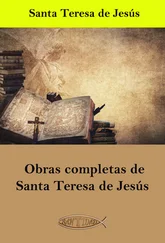18. Oh, how deluded I was in this expectation! The devil would have held it out before me till the day of judgment, that he might then take me with him to hell. Then, when I applied myself to prayer and to spiritual reading,--whereby I might perceive these truths, and the evil nature of the way I was walking in, and was often importunate with our Lord in tears,--I was so wicked, that it availed me nothing; when I gave that up, and wasted my time in amusing myself, in great danger of falling into sin, and with scanty helps,--and I may venture to say no help at all, unless it was a help to my ruin,--what could I expect but that of which I have spoken?
19. I believe that a certain Dominican friar, a most learned man, has greatly merited in the eyes of God; for it was he who roused me from this slumber. He made me--I think I said so before 8--go to Communion once a fortnight, and be less given to evil; I began to be converted, though I did not cease to offend our Lord all at once: however, as I had not lost my way, I walked on in it, though slowly, falling and rising again; and he who does not cease to walk and press onwards, arrives at last, even if late. To lose one's way is--so it seems to me--nothing else but the giving up of prayer. God, of His mercy, keeps us from this!
20. It is clear from this,--and, for the love of God, consider it well,--that a soul, though it may receive great graces from God in prayer, must never rely on itself, because it may fall, nor expose itself in any way whatever to any risks of sin. This should be well considered because much depends on it; for the delusion here, wherein Satan is able to entangle us afterwards, though the grace be really from God, lies in the traitor's making use of that very grace, so far as he can, for his own purpose, and particularly against persons not grown strong in virtues, who are neither mortified nor detached; for these are not at present strong enough--as I shall explain hereafter 9--to expose themselves to dangerous occasions, notwithstanding the noble desires and resolutions they may have.
21. This doctrine is excellent, and not mine, but the teaching of God, and accordingly I wish ignorant people like myself knew it; for even if a soul were in this state, it must not rely so much upon itself as to go forth to the battle, because it will have enough to do in defending itself. Defensive armour is the present necessity; the soul is not yet strong enough to assail Satan, and to trample him under foot, as those are who are in the state of which I shall speak further on. 10
22. This is the delusion by which Satan prevails: when a soul sees itself so near unto God, when it sees the difference there is between the things of heaven and those of earth, and when it sees the love which our Lord bears it, there grows out of that love a certain trust and confidence that there is to be no falling away from that the fruition of which it then possesses. It seems to see the reward distinctly, as if it were impossible for it to abandon that which, even in this life, is so delicious and sweet, for anything so mean and impure as worldly joy. Through this confidence, Satan robs it of that distrust which it ought to have in itself; and so, as I have just said, 11the soul exposes itself to dangers, and begins, in the fulness of its zeal, to give away without discretion the fruit of its garden, thinking that now it has no reason to be afraid for itself. Yet this does not come out of pride; for the soul clearly understands that of itself it can do no good thing; but rather out of an excessive confidence in God, without discretion: because the soul does not see itself to be unfledged. It can go forth out of its nest, and God Himself may take it out, but still it cannot fly, because the virtues are not strong, and itself has no experience wherewith to discern the dangers; nor is it aware of the evil which trusting to itself may do it.
23. This it was that ruined me. Now, to understand this, and everything else in the spiritual life, we have great need of a director, and of conference with spiritual persons. I fully believe, with respect to that soul which God raises to this state, that He will not cease to be gracious to it, nor suffer it to be lost, if it does not utterly forsake His Majesty. But when that soul--as I said--falls, let it look to it again and again, for the love of our Lord, that Satan deceive it not by tempting it to give up prayer, as he tempted me, through that false humility of which I have spoken before, 12and would gladly speak of again and again. Let it rely on the goodness of God, which is greater than all the evil we can do. When we, acknowledging our own vileness, desire to return into His grace, He remembers our ingratitude no more,--no, not even the graces He has given us, for the purpose of chastising us, because of our misuse of them; yea, rather, they help to procure our pardon the sooner, as of persons who have been members of His household, and who, as they say, have eaten of His bread.
24. Let them remember His words, and behold what He hath done unto me, who grew weary of sinning before He grew weary of forgiving. He is never weary of giving, nor can His compassion be exhausted. Let us not grow weary ourselves of receiving. May He be blessed for ever, Amen; and may all created things praise Him!
1See ch. xx. § 2.
2See ch. xvii. § 3.
3Ch. vii. § 17, and ch. viii. § 5.
4Psalm cxviii. 137: "Thou art just, O Lord, and Thy judgment is right."
5See ch. xxv.
6See ch. viii. § 1.
7Ch. vii. § 17.
8Ch. vii. § 27.
9Ch. xxxi. § 21.
10Ch. xx. § 33, and ch. xxv. § 24.
11Ch. xix. § 4.
12See § 16.
Table of Contents
The Difference Between Union and Rapture. What Rapture Is. The Blessing It Is to the Soul. The Effects of It.
1. I wish I could explain, with the help of God, wherein union differs from rapture, or from transport, or from flight of the spirit, as they speak, or from a trance, which are all one. 1I mean, that all these are only different names for that one and the same thing, which is also called ecstasy. 2It is more excellent than union, the fruits of it are much greater, and its other operations more manifold; for union is uniform in the beginning, the middle, and the end, and is so also interiorly. But as raptures have ends of a much higher kind, they produce effects both within and without. 3As our Lord has explained the other matters, so also may He explain this; for certainly, if He had not shown me in what way and by what means this explanation was in some measure possible, I should never have been able to do it.
2. Consider we now that this last water, of which I am speaking, is so abundant that, were it not that the ground refuses to receive it, we might suppose that the cloud of His great Majesty is here raining down upon us on earth. And when we are giving Him thanks for this great mercy, drawing near to Him in earnest, with all our might, then it is our Lord draws up the soul, as the clouds, so to speak, gather the mists from the face of the earth, and carries it away out of itself,--I have heard it said that the clouds, or the sun, draw the mists together, 4--and as a cloud, rising up to heaven, takes the soul with Him, and begins to show it the treasures of the kingdom which He has prepared for it. I know not whether the comparison be accurate or not; but the fact is, that is the way in which it is brought about. During rapture, the soul does not seem to animate the body, the natural heat of which is perceptibly lessened; the coldness increases, though accompanied with exceeding joy and sweetness. 5
3. A rapture is absolutely irresistible; whilst union, inasmuch as we are then on our own ground, may be hindered, though that resistance be painful and violent; it is, however, almost always impossible. But rapture, for the most part, is irresistible. It comes, in general, as a shock, quick and sharp, before you can collect your thoughts, or help yourself in any way, and you see and feel it as a cloud, or a strong eagle rising upwards, and carrying you away on its wings.
Читать дальше












